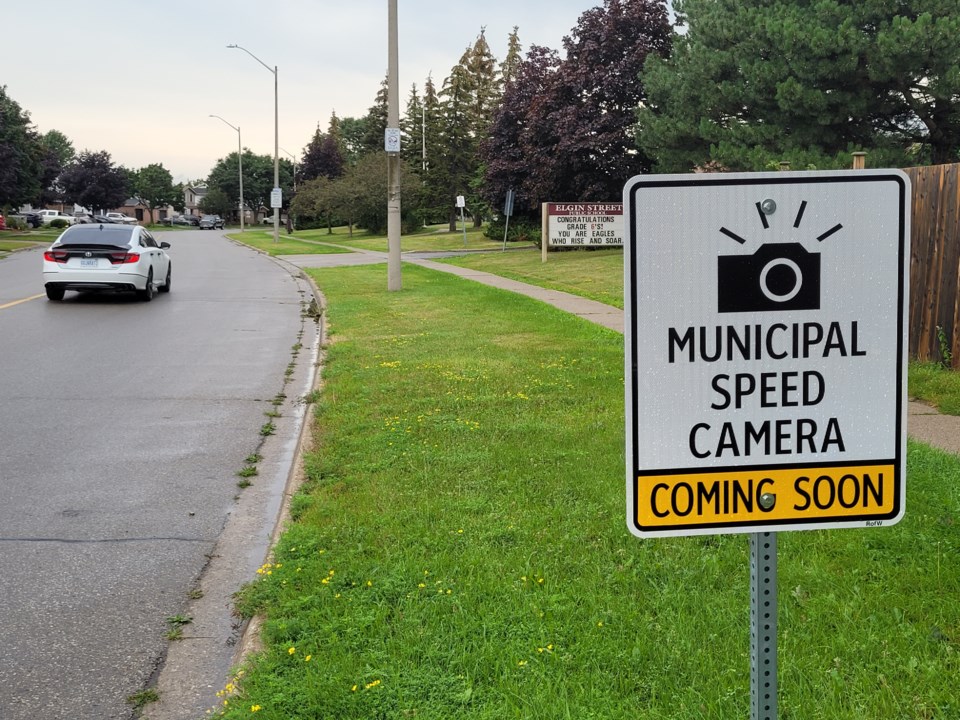A month after approving the installation of 16 new automated speed enforcement cameras in school zones across Waterloo region by the end of the year, regional council is being asked to approve a $20 million plan that will see all 175 school zones equipped with the cameras by 2028.
The five-year plan pitched by regional staff this week will ask to expand the Automated Speed Enforcement (ASE) Program to between 25 and 30 additional school zones next year, subject to 2024 budget approval. The capital cost of the providing the ASE's would be about $1.5 million next year alone.
The previous annual revenue estimate from the eight cameras installed in the first phase of the program was $200,000. That means the program would bring in an estimated $4.375 million annually once all cameras are operational.
In a nine month period in 2022, over 5,000 tickets were sent out from 16 locations resulting in over $180,000 in fines.
The recommendation also requests staff be directed to prepare and submit staffing and budget requirements as part of the 2024 budget for the remaining years of the program.
The region also wants to develop criteria for identifying and prioritizing Community Safety Zones (CSZ) for the purpose of implementing ASEs in "other critical locations around the region."
That will come as good news to Cambridge council after they unanimously approved a motion asking the region to designate McQueen Shaver Boulevard a CSZ last month. Under current Highway Traffic Act rules, the ASEs can only be installed in school zones and designated CSZs.
The region established eight CSZs in the early 2000s after it was determined signage was ineffective at influencing driving behaviour.
Staff is investigating the feasibility of implementing the ASEs in "critical Community Safety Zones" but is recommending they be deployed in a consistent manner to all municipalities in the region and will provide an update to council this fall on where staff believe it's warranted.
Staff report some schools may not be suitable for ASE cameras since they rely on clear sightlines. Some schools are situated on roads with horizontal curves, vertical curves, physical obstructions, and insufficient boulevard space.
The introduction of ASE cameras has helped reduce average travel speeds in school zones enforced through ASE by between 2 km/h and 9 km/h. The number of motorists complying with the posted speed limit in those zones increased by an average of 63 per cent.
After seeing the results from the first full year of the program in February, council directed staff to “present a roadmap for a rapid implementation" to all school zones with upcoming strategic planning.
Staff was asked to include costing for the infrastructure, addition of cameras, and programming of the camera technology, market capacity to respond, staff resources and budgets and administrative capacity required as well as options for increasing processing capacity.
Staff is recommending the region continue to use of semi-fixed locations through 2024, which involves rotating cameras between up to 60 sites.
Starting in 2025, staff recommend fixing cameras at all sites to maximize the effectiveness of the ASE program.
Since the expanded program will require additional processing capacity, the region is creating a business case to create a regional ASE processing centre.
The current arrangement has the City of Toronto Joint Municipal Processing Centre handling photos and issuing tickets through the regionally-operated Provincial Offences Court administration.
During the first phase of the program, between October 2021 and March 2022, the Toronto Provincial Offences court issued 2,673 tickets; a number that was in line with staff estimates.
The region believes a regional processing centre would require about 35 new full-time equivalent positions to handle the volume of infractions anticipated by the proposed ASE program expansion once it's fully implemented.



